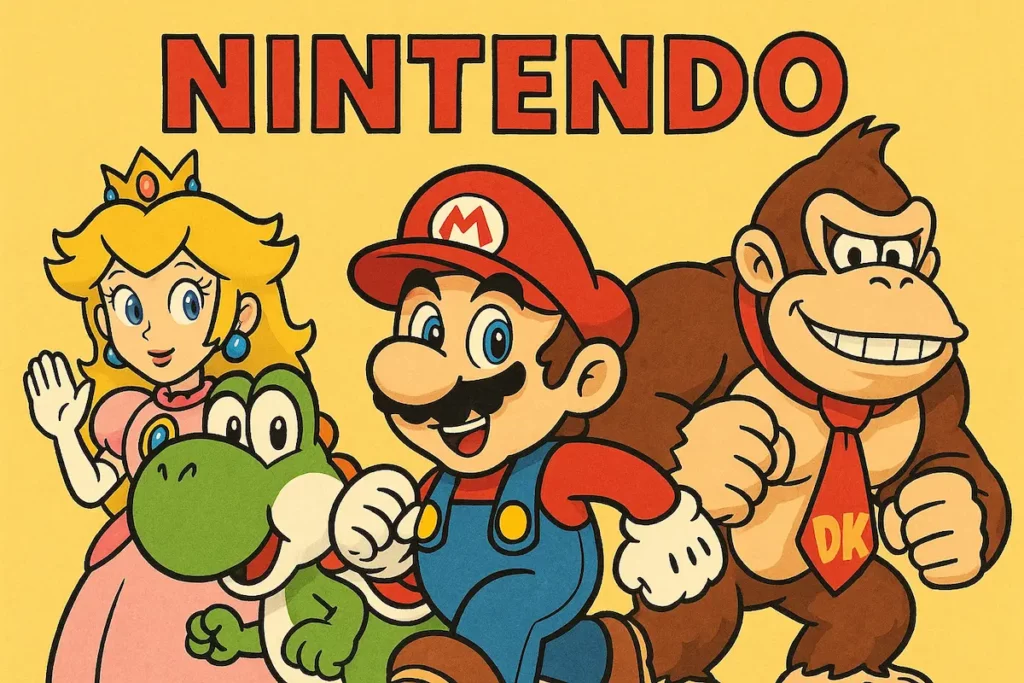
How to set up parental controls on Nintendo Switch
Discover detailed steps to design the perfect parental controls on your Nintendo Switch—ensuring safe playtime and content access for your child.
Nintendo started long before video games were even a thing, but exactly when did it all begin? Its journey from humble beginnings to a gaming giant is full of surprising twists.

Curious about Nintendo’s origins and how it grew into the company behind Mario, Zelda, and Pokémon? Let’s take a closer look at the story of when Nintendo was created.
Nintendo was founded in the year 1889, a key milestone for the gaming industry.
From its early days as a playing card maker in Kyoto, Japan, the company set the stage for future innovation in games and interactive entertainment.
Knowing that Nintendo was founded in the year 1889 helps fans and players understand how its legacy evolved from traditional cards to iconic consoles and beloved game franchises.
Today’s gaming culture owes much to that origin story, and remembering that Nintendo was founded in the year 1889 highlights how history shaped the way we play.
Nintendo name origin: Although the Nintendo name is now synonymous with video games, the Nintendo name origin actually reflects deep Japanese roots and a guiding philosophy.
The term blends “nin” (entrusted) and “ten-dō” (heaven), suggesting a mission to deliver trustworthy entertainment.
This cultural meaning shows how the Nintendo name origin emphasized reliability and good fortune, shaping the brand’s identity long before its biggest hits in gaming.
Initially, the company concentrated on producing handmade playing cards, catering to traditional Japanese games.
This focus marked an important chapter in playing card history, as Nintendo introduced early product innovations that distinguished its cards in quality and design.
These efforts laid the foundation for Nintendo’s reputation in games, emphasizing craftsmanship and appealing to a broad domestic market within Japan’s gaming culture.
As demand for traditional playing cards waned, Nintendo looked for fresh opportunities in the entertainment world. This shift marked a key moment in the playing card evolution, moving the brand beyond its original roots.
Embracing entertainment diversification, Nintendo expanded into toys, arcade games, and eventually video games. This strategic change laid the foundation for its future as a leader in gaming, adapting to changing market interests and consumer preferences.
By stepping from cards to consoles, the company turned the playing card evolution into a springboard for innovation, proving how smart pivots can shape the future of games.
Today, that playing card evolution is a reminder that great gaming brands grow by evolving with players.
Several key figures played crucial roles in shaping Nintendo’s early history, guiding its transformation from a playing card company into a global leader in video games.
These innovators and company visionaries introduced bold strategies and groundbreaking game ideas, laying the foundation for franchises that defined the games industry.
Thanks to their leadership, Nintendo adapted to changing markets and pioneered new forms of interactive entertainment, positioning the company for long-term success in games far beyond traditional card manufacturing.
Nintendo’s expansion in the 20th century transformed the company from a traditional playing card maker into a major player in entertainment and games.
During this period, Nintendo explored new markets by creating innovative toys and family-friendly games, responding to changing consumer interests and trends.
This strategic move into games paved the way for its future in electronic gaming, building a strong foundation for the brand and helping Nintendo become a leader in the world of games.
Nintendo’s video game division began in the early 1970s, when the company saw the rising potential of electronic entertainment.
Building on its experience with toys and traditional games, Nintendo made a strategic move to focus on video games and create new interactive experiences.
This shift helped establish Nintendo’s video game division as a leader in digital entertainment, setting the stage for innovative video game development that would shape the future of gaming.
Nintendo’s gaming innovation has shaped the industry with bold ideas and timeless experiences. From the early days, Nintendo’s gaming innovation created iconic characters and gameplay that set the bar for fun and accessibility.
Hardware breakthroughs like the Game Boy and the Nintendo Switch reimagined how and where we play, proving that Nintendo’s gaming innovation can blend creativity and technology to inspire players and developers around the world.
Nintendo’s impact on the global market goes far beyond its iconic games and consoles. By shaping how people play and interact, Nintendo has changed consumer habits and set new industry standards.
Its influence in the global market is clear across regions, thanks to smart, adaptive strategies that combine creativity with solid business decisions.
Through redefining entertainment and engaging players worldwide, Nintendo continues to be a key force in the gaming industry and the global market, inspiring innovation in games and gaming culture.
Nintendo’s creation and growth began in 1889 as a playing card company, but over time, Nintendo transformed into a global leader in games and entertainment.
This evolution reflects a culture of creativity, innovation, and player-focused design.
Nintendo’s creation and growth influenced gaming trends worldwide, shaping a unique identity that blends tradition with cutting-edge technology.
Thanks to this balance, Nintendo’s creation and growth continues to leave a lasting impact on the games industry and pop culture.
Nintendo was created in 1889, marking the beginning of a transformative journey from a traditional playing card company to a pioneering force in gaming. Over the decades, Nintendo embraced innovation and adaptability, shaping global gaming culture and setting trends that defined multiple generations of players. From classic consoles to beloved franchises, Nintendo continues to influence the games industry with creativity, accessibility, and enduring fun. Today, Nintendo stands as a timeless icon in video games, inspiring both casual and hardcore gamers worldwide while proving that great games never go out of style.

Discover detailed steps to design the perfect parental controls on your Nintendo Switch—ensuring safe playtime and content access for your child.

Discover the key differences between the Nintendo Switch OLED and regular Switch that could redefine your gaming experience—find out which truly stands out.

Boost your Nintendo Switch storage with simple steps and smart choices, but did you know there’s more to expanding space than just adding a microSD card?

Properly transferring data between Nintendo Switch consoles ensures your games and progress stay intact—discover the essential steps to make it seamless today.

Never let Joy-Con drift ruin your game again—discover essential tips and surprising fixes to restore precise control on your Nintendo Switch today.

Need to add friends on Nintendo Switch? Discover simple steps and hidden tips to connect with players worldwide and enhance your gaming experience.